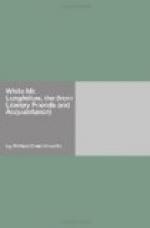THE WHITE MR. LONGFELLOW
We had expected to stay in Boston only until we could find a house in Old Cambridge. This was not so simple a matter as it might seem; for the ancient town had not yet quickened its scholarly pace to the modern step. Indeed, in the spring of 1866 the impulse of expansion was not yet visibly felt anywhere; the enormous material growth that followed the civil war had not yet begun. In Cambridge the houses to be let were few, and such as there were fell either below our pride or rose above our purse. I wish I might tell how at last we bought a house; we had no money, but we were rich in friends, who are still alive to shrink from the story of their constant faith in a financial future which we sometimes doubted, and who backed their credulity with their credit. It is sufficient for the present record, which professes to be strictly literary, to notify the fact that on the first day of May, 1866, we went out to Cambridge and began to live in a house which we owned in fee if not in deed, and which was none the less valuable for being covered with mortgages. Physically, it was a carpenter’s box, of a sort which is readily imagined by the Anglo-American genius for ugliness, but which it is not so easy to impart a just conception of. A trim hedge of arbor-vita; tried to hide it from the world in front, and a tall board fence behind; the little lot was well planted (perhaps too well planted) with pears, grapes, and currants, and there was a small open space which I lost no time in digging up for a kitchen-garden. On one side of us were the open fields; on the other a brief line of neighbor-houses; across the street before us was a grove of stately oaks, which I never could persuade Aldrich had painted leaves on them in the fall. We were really in a poor suburb of a suburb; but such is the fascination of ownership, even the ownership of a fully mortgaged property, that we calculated the latitude and longitude of the whole earth from the spot we called ours. In our walks about Cambridge we saw other places where we might have been willing to live; only, we said, they were too far off: We even prized the architecture of our little box, though we had but so lately lived in a Gothic palace on the Grand Canal in Venice, and were not uncritical of beauty in the possessions of others. Positive beauty we could not have honestly said we thought our cottage had as a whole, though we might have held out for something of the kind in the brackets of turned wood under its eaves. But we were richly content with it; and with life in Cambridge, as it began to open itself to us, we were infinitely more than content. This life, so refined, so intelligent, so gracefully simple, I do not suppose has anywhere else had its parallel.




